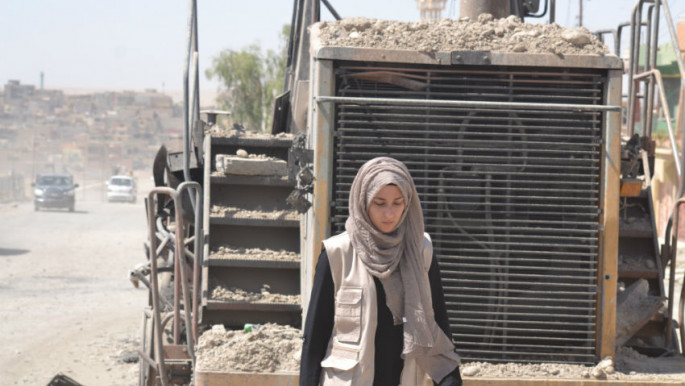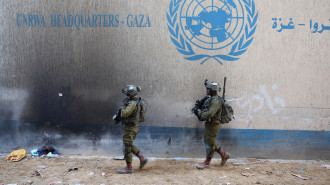Giving comfort in the chaos: Meeting aid worker Madiha Raza
It was not, however, until earlier this month, when she experienced the terror of US-led airstrikes first hand - from her hotel room in Damascus - when she felt scared for the first time.
She had been following the news on the evening of April 13. For days politicians' platitudes had been churned out alongside calls for "more investigations" into the alleged chemical attacks in Douma. So she went to bed not expecting in the least that she'd be woken up "around three thirty or four o'clock in the morning with deafening explosions just outside my room".
Read more: Syria airstrikes: What happened and why?
"The whole building was shaking and the windows were rattling," she says, as she explains the utter confusion of having no idea, in the near-total darkness, how far away the explosions were - or if the next one was going to strike her building - not least who was actually carrying them out. It was only by doing a quick internet search as the commotion subsided that she could find out what had been going on outside her window.
 |
It was the first time I'd say, having been in multiple war zones before, that I got the slightest idea of what people must go through |  |
"It was the first time I'd say, having been in multiple war zones before, that I got the slightest idea of what people must go through," she says.
The next day, however, the residents of Damascus carried on as usual. "Everyone was talking about it obviously, but then life just goes on as normal, you go to your meetings, go do what you need to do. It's in the air, but you've got to get on and do your thing."
Raza adds that there are some regime-supporting neighbourhoods of the city where you can't even tell there's been a civil war raging for the best part of a decade. Other war-torn suburbs tell a different story, however.
 |
|
| Raza in the field in Mosul [Muslim Aid] |
"It's a matter of; they needed everything," Raza says. "People need shelter, medical care, nutrition. As a humanitarian organisation it's really difficult to choose what kind of area of intervention you go for, especially in a country that's completely devastated by war.
"A child of seven would not have seen a school his whole life. All the education institutions are obviously destroyed," she adds.
Muslim Aid is a faith-based relief and development agency based in the UK, founded in 1985, working directly in the field and with partner organisations embedded in their local communities.
"Our mission is rooted in the compassionate teachings of Islam," the organisation says. "We target all in need - regardless of race, religion, gender, nationality or politics."
But it's the loss of childhood that Raza finds difficult to bear witness to, she says. "In Syria, these children have only ever seen war. If you speak to a six- or seven-year-old, they're so mature compared to what you'd expect. They've lost the idea of how to play and draw and just mess around because they're just running for their lives most of the time."
The schools set up by Muslim Aid are trying in some way to tackle this, through psychosocial therapy provided to their 1,900 pupils.
 |
When you leave your home, then you've lost your entire support network, you've lost your livelihood, you've lost your very basic necessities |  |
In spite of the chaos and devastation, the people are resilient and just want to move forward, Raza says. But in a country where 70 percent of its people are displaced, this proves difficult.
"The thing is, when you leave your home, then you've lost your entire support network, you've lost your livelihood, you've lost your very basic necessities. You just want to return home and start life again, because Syria was a thriving place once upon a time. Most of these people are educated, middle class people who had healthy livelihoods and were living well, and their life just got turned upside down within days."
It is for this reason she can't understand the case for US-led airstrikes, in which the UK and France also took part.
"Given that it was under the auspice of humanitarian intervention, people aren't seeing enough of that backed up by actual humanitarian assistance. You've done these strikes now under that auspice, but what else is it that you're doing?" She is visibly frustrated at the actions of those who have little understanding of what's happening on the ground in Syria.
Read more: Invasion, occupation and Islamic State: How four Iraqi women's lives have changed in 15 years
"The frustration I do feel," she laments, "is that people don't understand how it's just not a black-and-white political situation. It's really not how the media are painting it to be.
"People are saying, 'oh, but there weren't any casualties during the airstrikes, so what's the big deal?' Well it is a big deal because if bombs are falling on the city, people are still going to leave, and when people flee, they lose their support network, they lose their home, everything they know."
 |
It's not as simple as like 'no one died', it's not as black-and-white as that |  |
"So you're still displacing people. It's not as simple as 'no one died', it's not as black-and-white as that," she concludes.
Raza's feelings towards this are not surprising, given that she has witnessed the vulnerability of people forced to flee their homes. One story in particular stuck with her, that of a woman she met in Mosul who, heavily pregnant, had to escape from IS with her three young daughters after the militants arrested her husband.
"Having four sisters myself, it just really struck me. The feelings, trauma, challenges of life she must be going through on a daily basis, just wondering how she's going to survive day-to-day because she's got no means of income. She has to rely on aid agencies like us; she's got no choice."
Read more: The struggles of being a feminist in the Middle East
Through stories like these, Raza underlines the importance of having female aid workers on the ground, although they are scarce.
"Just by virtue of being female, you're able to connect and give comfort in a different way. Even if you just get to comfort them by holding their hand and listening to their story. The stories I've heard, women who have been raped on their journey from Myanmar to Bangladesh, that's not something that they would easily tell a man."
Being one of only a handful of female aid workers hasn't come without its challenges, however. "So I wanted to get into certain parts of Syria to visit this time, and they said 'no, because you're a woman you can't'. I was like, really? Like, come on! I've been to Mosul after IS liberation. It was too dangerous? I was like really, come on man!"
Her religion, too, has helped her connect with her charitable work as well as providing her organisation with access to areas otherwise closed off to aid agencies.
Her upcoming trip to Jordan and Lebanon, where she will work with refugees and victims of exploitation will again require the positivity, productivity and fearlessness she exudes. Does she get restless at home in London? Not necessarily.
"When I got back from Syria, I got into my bed and I was like 'uhh.. my bed, I love my bed'. Thank God for it. But my heart still goes out to all the people that sleep without comfort every night."
Quite simply, the drive to do more for the people that need it keeps her going. "If I can make a difference somewhere, that's when I feel like, yeah, let's go."
Florence is a Middle-East focused journalist and staff writer at The New Arab.
Follow her on Twitter @flo_dix
The New Arab Meets: Click on our Special Contents tab to read more on our ever-growing archive of interviews

![Palestinians mourned the victims of an Israeli strike on Deir al-Balah [Getty]](/sites/default/files/styles/image_684x385/public/2024-11/GettyImages-2182362043.jpg?h=199d8c1f&itok=xSHZFbmc)


![The law could be enforced against teachers without prior notice [Getty]](/sites/default/files/styles/image_684x385/public/2178740715.jpeg?h=a5f2f23a&itok=hnqrCS4x)
 Follow the Middle East's top stories in English at The New Arab on Google News
Follow the Middle East's top stories in English at The New Arab on Google News


